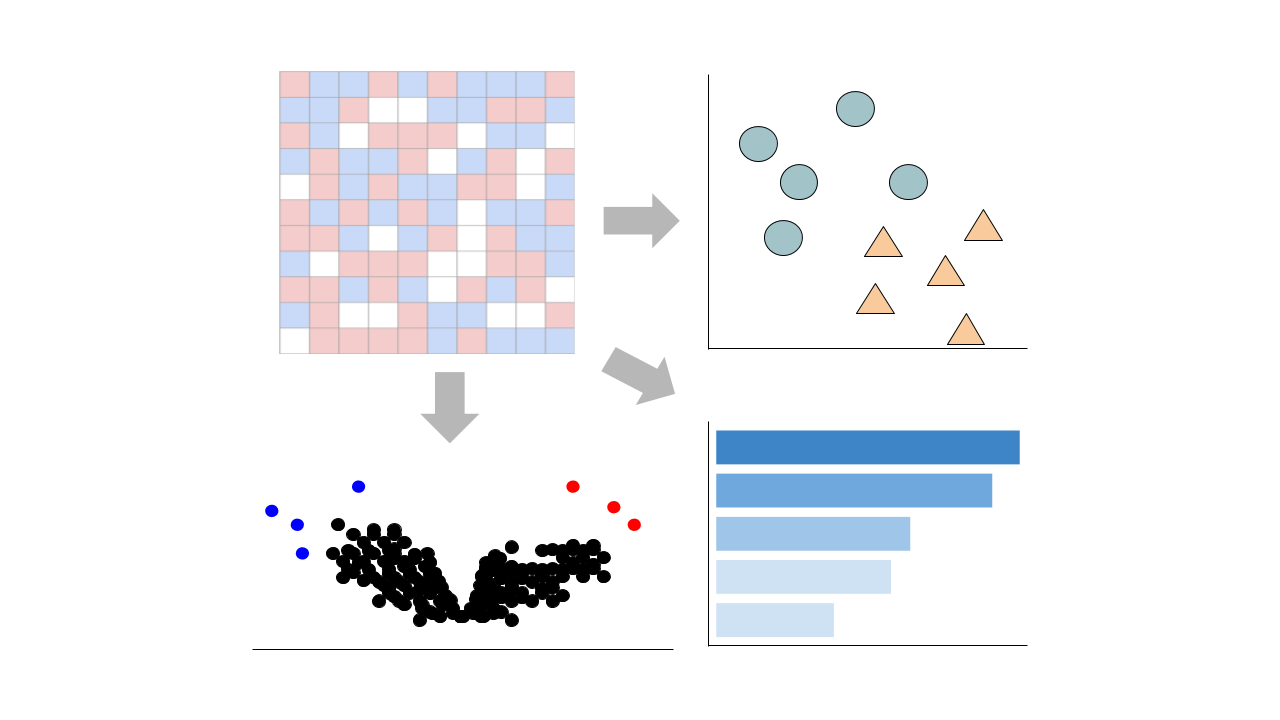 Gene counts are sourced from ARCHS4, which provides uniform alignment of GEO samples.
You can learn more about ARCHS4 and its pipeline here.
Gene counts are sourced from ARCHS4, which provides uniform alignment of GEO samples.
You can learn more about ARCHS4 and its pipeline here.
Select conditions below to toggle them from the plot:
| GROUP | CONDITION | SAMPLES |
|---|---|---|
| Liver |
GSM5396618 GSM5396619 GSM5396620
|
|
|
GSM5396612 GSM5396613 GSM5396614 GSM5396615 GSM5396616 GSM5396617
|
Submission Date: Jun 23, 2021
Summary: β cell proliferation rates decline with age and adult β cells have limited self-duplicating activity for regeneration, which predisposes to diabetes. Here we show that, among MYC family members, Mycl was expressed preferentially in proliferating immature endocrine cells. Genetic ablation of Mycl caused a modest reduction in cell proliferation of pancreatic endocrine cells in neonatal mice. By contrast, systemic expression of Mycl in mice stimulated proliferation in pancreatic islet cells and resulted in expansion of pancreatic islets without forming tumors in other organs. Single-cell RNA sequencing and genetic tracing experiments revealed that the expression of Mycl provoked transcription signatures associated with immature proliferating endocrine cells and stimulated self-duplication in adult hormone-expressing cells. The expanded hormone-expressing cells ceased proliferation but persisted after withdrawal of Mycl expression. Remarkably, a subset of the expanded α cells gave rise to insulin-producing cells after the withdrawal. Moreover, transient Mycl expression in vivo was sufficient to normalize increased blood glucose levels in diabetic mice evoked by chemical ablation of β cells. In vitro expression of Mycl similarly provoked active replication without inducing apoptosis in adult hormone-expressing islet cells, even those from aged mice. Furthermore, the expanded islet cells functioned in diabetic mice after transplantation. Finally, we show that MYCL stimulated self-duplication of human adult cadaveric islet cells. Collectively, these results demonstrate that sole induction of Mycl expands adult β cells both in vivo and in vitro. Moreover, islet cell-specific reprogramming via transient Mycl transduction elicits endogenous expansion of insulin-producing cells in adult pancreas through both self-duplication of β cells and transdifferentiation ofα cells into insulin-producing cells, which may provide a regenerative strategy of β cells.
GEO Accession ID: GSE178726
PMID: No Pubmed ID
Submission Date: Jun 23, 2021
Summary: β cell proliferation rates decline with age and adult β cells have limited self-duplicating activity for regeneration, which predisposes to diabetes. Here we show that, among MYC family members, Mycl was expressed preferentially in proliferating immature endocrine cells. Genetic ablation of Mycl caused a modest reduction in cell proliferation of pancreatic endocrine cells in neonatal mice. By contrast, systemic expression of Mycl in mice stimulated proliferation in pancreatic islet cells and resulted in expansion of pancreatic islets without forming tumors in other organs. Single-cell RNA sequencing and genetic tracing experiments revealed that the expression of Mycl provoked transcription signatures associated with immature proliferating endocrine cells and stimulated self-duplication in adult hormone-expressing cells. The expanded hormone-expressing cells ceased proliferation but persisted after withdrawal of Mycl expression. Remarkably, a subset of the expanded α cells gave rise to insulin-producing cells after the withdrawal. Moreover, transient Mycl expression in vivo was sufficient to normalize increased blood glucose levels in diabetic mice evoked by chemical ablation of β cells. In vitro expression of Mycl similarly provoked active replication without inducing apoptosis in adult hormone-expressing islet cells, even those from aged mice. Furthermore, the expanded islet cells functioned in diabetic mice after transplantation. Finally, we show that MYCL stimulated self-duplication of human adult cadaveric islet cells. Collectively, these results demonstrate that sole induction of Mycl expands adult β cells both in vivo and in vitro. Moreover, islet cell-specific reprogramming via transient Mycl transduction elicits endogenous expansion of insulin-producing cells in adult pancreas through both self-duplication of β cells and transdifferentiation ofα cells into insulin-producing cells, which may provide a regenerative strategy of β cells.
GEO Accession ID: GSE178726
PMID: No Pubmed ID
Visualize Samples
 Visualizations are precomputed using the Python package scanpy on the top 5000 most variable genes.
Visualizations are precomputed using the Python package scanpy on the top 5000 most variable genes.
Precomputed Differential Gene Expression
 Differential expression signatures are automatically computed using the limma R package.
More options for differential expression are available to compute below.
Differential expression signatures are automatically computed using the limma R package.
More options for differential expression are available to compute below.
Signatures:
Select conditions:
Control Condition
Perturbation Condition
Only conditions with at least 1 replicate are available to select
 Differential expression signatures can be computed using DESeq2 or characteristic direction.
Differential expression signatures can be computed using DESeq2 or characteristic direction.
This pipeline enables you to analyze and visualize your bulk RNA sequencing datasets with an array of downstream analysis and visualization tools. The pipeline includes: PCA analysis, Clustergrammer interactive heatmap, library size analysis, differential gene expression analysis, enrichment analysis, and L1000 small molecule search.

 Chatbot
Chatbot Single Gene Queries
Single Gene Queries
 Gene Set Queries
Gene Set Queries
 Bulk Studies
Bulk Studies
 Single Cell Studies
Single Cell Studies
 Hypotheses
Hypotheses
 Resources
Resources
 Contribute
Contribute
 Downloads
Downloads About
About
 Help
Help